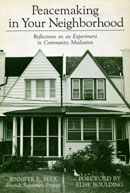
Peacemaking in Your Neighbourhood
Reflections on an Experiment in Community Mediation
Beer, Jennifer E.
Publisher: Friends Suburban Project, New Society Press, USA
Year Published: 1986
Pages: 245pp Price: $18.99 (pb) ISBN: 0-86571-071-6 (pb), 0-86571-072-4 (hc)
Resource Type: Book
Cx Number: CX3933
Describes ten years of work of the Community Dispute Settlement Program, an innovative program in a suburban area near Philadelphia, founded by the Society of Friends (Quakers). The program set out to try to help solve community disputes using the guidelines of nonviolence, alternatives, and empowerment.
Abstract:
This book sets out to answer the question, "If we can't peacefully resolve conflicts with our neighbours, how can we expect to resolve conflicts between nations?" Peacemaking in Your Neighbourhood describes ten years of work of the Community Dispute Settlement Program, an innovative program in a suburban area near Philadelphia, founded by the Society of Friends (Quakers). The program set out to try to help solve community disputes using the guidelines of nonviolence, alternatives, and empowerment. The idea was that community dispute settlement would be an experimental alternative to suing family members or neighbours in court. Early intervention in community conflicts would decrease the potential for violence and provide a model for handling future troubles. Disputants would construct their own agreements, so that mediation would empower people to take control over their own problems.
Peacemaking in Your Neighbourhood is an excellent introduction to the idea of community dispute settlement, but the real strength of the book lies in the actual descriptions of actual disputes and how the process of trying to solve them went, and the only regret about this book is that there weren't more such descriptions included.
Table of Contents
Foreward by Elise Boulding
Acknowledgements
Introduction
Part I
One: The Session
Opening Statement
Uninterrupted Time
The Exchange
Building the Agreement
Writing the Agreement
Closing
What really happens?
Two: The Disputant
Who comes to Community Dispute Settlement?
What do people fight about?
The mediation experience
Satisfaction
Three: The Mediator
Who are the mediators?
Qualifications and training
Satisfactions
Expectations
The mediation experience
Four: Outsider in the Middle
The outsider
The middle
Mediator power
Control and responsibility
Five: Shaping the Mediator Role
Role models: limits and uses
Other influences
A Quaker program
Women's leadership
Six: The Mediation Model
Values and assumptions
Format and policies
Mediating in pairs
The Facts
Consensus or compromise
Outcomes
Empowerment
Part II
Seven: The Program Model
An overview of the CDS program
The new idea
Different program models
Major program decisions
Staffing
Referrals and constituency
Intake
Records and confidentiality
Evaluating mediators
Survival
Eight: The Community
The professional community
The legal community
The police
Officials, agencies, schools, and churches
Mediation's place in the suburban neighborhood
Rules and social norms
Isolation and independence
Choosing: Rules of relationships?
Spreading the skills
Nine: Dreams of Justice, Dreams of Peace
Alternative to the criminal justice system
Protection, access, and coercion
Pacification and control
Social change
Looking back
Future directions
A kernel of radical change?
Conclusions?
Bibliography
Subject Headings


